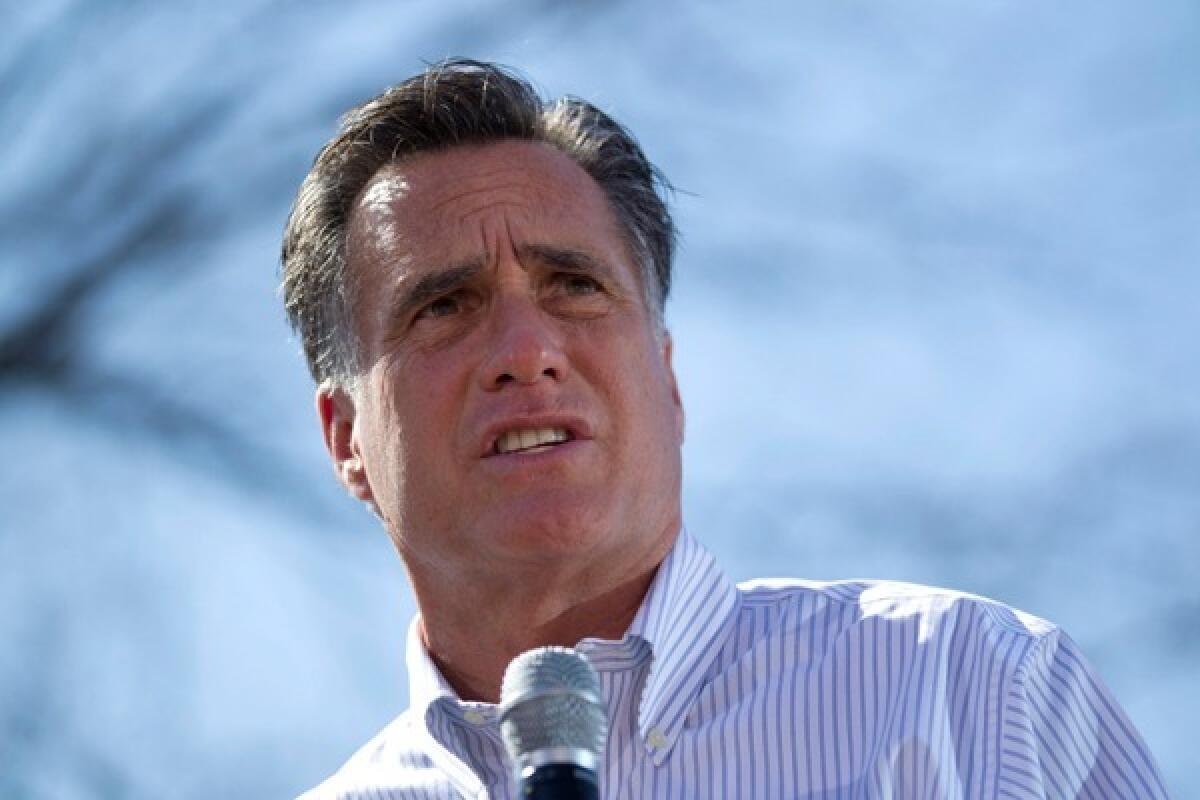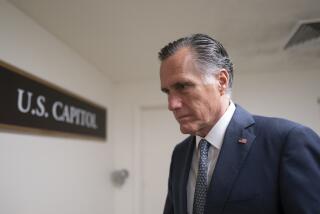McManus: Will Romney be the GOP’s Dukakis?

- Share via
There’s an old saying in Republican politics: Massachusetts produces only two exports — lobsters and liberals — and neither one travels well.
That’s what GOP strategists said in 1988 when then-Gov. Michael S. Dukakis was the Democratic presidential nominee, and in 2004, when Sen. John F. Kerry ran and lost.
But this year, they’re glumly pondering whether that cranky old rule also applies to their own purported front-runner, former Gov. Mitt Romney.
COMMENTARY AND ANALYSIS: Presidential Election 2012Romney’s not really a liberal despite what his conservative critics say. But he sure hasn’t always traveled well. Despite his claim to be the candidate with the broadest national appeal, Romney has failed to win anywhere in the Republican strongholds of the rural Midwest and the Deep South.
It’s true that he’s won primaries in some of the swing states that will be critical in this fall’s general election campaign: Florida, Ohio, Michigan.
But despite those victories, the campaign hasn’t been good for Romney. Instead of helping him look more presidential, it’s made him look testy and calculating. Instead of building up his numbers in the national polls, it’s ground them down.
Last fall, as the campaign was getting under way, 36% of the nation’s voters had a generally unfavorable opinion of Romney, according to Fox News polling; now, after months of primary-battle nastiness, that number is up to 49%.
And with three rival candidates all promising to stay in the race through the last primaries in June, he faces three more months of the same battering.
Romney’s beginning to look a bit like a Republican version of Dukakis: a Massachusetts governor who might win the nomination by outlasting weak opponents but who may never quite win his party’s heart — or the nation’s.
That’s partly because, as Dukakis did, Romney is selling himself as a better manager for the federal government, not as the leader of a grand crusade. It’s not a message that gets the blood flowing. Yes, he says his campaign is “a battle for the soul of America,” but he doesn’t always sound as if he means it.
Besides, his campaign rarely stays on that high plane for long. Instead, Romney’s main message this month has been technical and tactical: that he’s amassing more delegates than anyone else, so it’s time for his rivals to get out of the way.
As a practical political forecast, that may be sound thinking. But as the rallying call for a political party, it has all the charm of the warning of the villainous Borg in “Star Trek”: “Resistance is futile.”
One apparent effect of that kind of campaign can be seen in a Gallup Poll released last week: Only about one-third of Republican voters now say they will support Romney enthusiastically if he’s the nominee. More precisely, 35% of Republicans and Republican-leaning independents said they would vote for Romney enthusiastically; 42% said they would vote for him, but mainly as a vote against President Obama; 8% said they would vote for Obama, and 11% said they would stay home.
It’s not unusual for voters to take time reconciling themselves to their party’s choice of a nominee. In 2008, many Hillary Rodham Clinton supporters who vowed initially that they would never vote for Obama voted for him in the end.
But here’s the real danger sign for Romney in those Gallup results: He’s performing significantly worse than the GOP’s 2008 nominee,Sen. John McCainof Arizona, did four years ago. In early 2008, 47% of Republican voters said they would vote for McCain with enthusiasm — and back then, hard-core conservatives were condemning McCain as too moderate, much as they criticize Romney today.
That doesn’t mean Republican voters won’t turn out this fall; an earlier Gallup Poll found that GOP voters are more enthusiastic than Democrats about voting in general this year. But it does suggest that if Romney wins the nomination, he won’t be starting his general election campaign with much of a head of steam.
Romney’s still likely to grind out a victory in the delegate count and win the nomination. But then again, that’s precisely what Dukakis did, prevailing over a field that included Jesse Jackson, Dick Gephardt, Paul Simon, Gary Hart, Joe Biden and Al Gore. That year, 1988, was a low-enthusiasm year for voters in both parties. It’s beginning to look as if 2012 will be one too.
More to Read
A cure for the common opinion
Get thought-provoking perspectives with our weekly newsletter.
You may occasionally receive promotional content from the Los Angeles Times.







